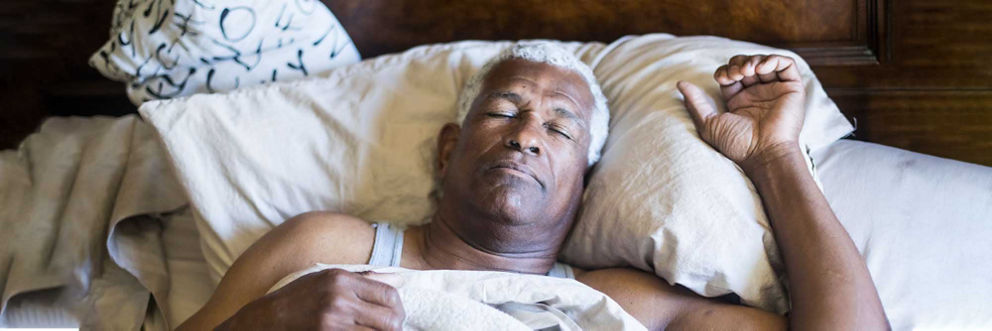Sleep medicine
Our team of sleep experts specialize in treating all sleep conditions at many locations in the Twin Cities and western Wisconsin.
We use the latest in research and technology to diagnose and treat even the most complex sleep disorders.
You’ll get a treatment plan personalized to fit your lifestyle, from a care team focused on helping you get consistent, restful sleep.
Sleep is one of the most important parts of our health, but a good night’s sleep can sometimes feel out of reach. While the occasional night tossing and turning is normal, ongoing sleep deficiency can increase your risk of developing other health problems like diabetes, high blood pressure and heart disease.
At HealthPartners and Park Nicollet, our team of sleep medicine experts includes pulmonologists, neurologists, sleep psychologists, sleep technicians, nurses and other specialists that work closely together to find the root cause of your sleep problem and develop treatment options that fit your lifestyle. Our goal is to find a plan that enables you to consistently get restful sleep.
Sleep disorders we treat
- Sleep apnea
- Insomnia
- Snoring
- Shift work disorder
- Parasomnias
- REM sleep behavior disorder
- Restless leg syndrome
- Narcolepsy
- Advanced sleep phase syndrome
- Delayed sleep phase syndrome
- Periodic limb movement disorder
- Sleepwalking
Symptoms of sleep disorders
Everyone experiences restless nights from time to time. If you have one or more of these common sleep disorder symptoms for more than three weeks, you may want to consider visiting a doctor:
- Daytime sleepiness
- Difficulty falling and staying asleep
- Difficulty focusing
- Forgetfulness
- Irresistible urge to move while sleeping
- Irritability, depression or anxiety related to lack of sleep
- More frequent mistakes or accidents
- Morning headaches
- Nightmares or night terrors
- Restless leg syndrome
- Sleep paralysis
- Snoring
- Unusual breathing while sleeping
- Waking up by choking or gasping
- Waking up with a sore or dry throat
Diagnosing sleep disorders
These tests are commonly used to diagnose sleep conditions:
Sleep diary
A sleep diary is a log of sleep habits that’s kept for about two weeks. We will use the sleep diary to help identify patterns, external factors and habits that could be causing sleep issues. If you have concerns about your sleep habits, start keeping a sleep diary now. You’ll be able to come to your appointment with information that can help us determine the next steps for your treatment.
Sleep study
A sleep study is a non-invasive test that tracks what happens to your body while you sleep. A sleep technician will gently place sensors on your body so we can measure your heartbeat, breathing, sleep cycles, eye movements, body movements and oxygen levels in your blood. Our doctors will use this information to diagnose sleep disorders and decide which treatment options are best. All of our sleep studies are reviewed by one of our board-certified sleep doctors.
Many sleep studies can be done at home. Other times, you’ll sleep at one of our specialty centers. There, you’ll sleep in a private, comfortable room. The room is similar to a hotel room and includes things to make you more comfortable like TV, internet and room-darkening window shades. A sleep technician will monitor your sleep from another room.
Treating sleep disorders
Our sleep specialists will work with you to determine the best course of treatment for your needs. Common treatment options include:
CPAP (Continuous Positive Airway Pressure) machine
A CPAP machine is the most common
Insomnia program
Our insomnia program involves therapies that give you the skills to stop thoughts or behaviors that make it hard to sleep. Common techniques include:
Stimulus control – By only getting into bed when tired and leaving the bed if unable to fall asleep, you help establish the bed as a cue for sleeping. This includes forming habits like only getting into bed when you’re feeling sleepy and avoiding reading, watching TV or lying awake in bed. If you don’t fall asleep in 20 minutes, get out of bed until you’re ready to try again.
Sleep restriction – This method limits the amount of time spent in bed to the average amount of time you actually sleep per day, increasing it slowly over time. If you sleep for an average of five hours per night, spend only five hours in bed each night, including the amount of time it takes you to fall asleep.
Relaxation training – This teaches you how to relax your mind and body to reduce stress and
Sleep hygiene training – The purpose of this treatment is to help you learn good sleep habits and behaviors that help you stick to a regular sleep schedule every night. Having good
Medicines
Medicines are often prescribed to treat conditions like restless leg syndrome, narcolepsy and insomnia. The types of medicine vary based on the condition or symptom it’s meant to treat. Sleeping pills, stimulants, pain medication and anti-depressants are commonly prescribed to treat sleep disorders.
Oral appliances
An oral appliance is a plastic device that fits into your mouth. It’s similar to a mouth guard or a retainer. The purpose of the device is to open your airways by holding your tongue in place. Oral appliances are most commonly used to treat snoring.
Lifestyle changes
We often recommend that patients make some lifestyle adjustments in addition to other treatment options. Factors like drinking alcohol, smoking, stress, excess weight, lack of exercise and no clear sleep schedule contribute to sleep disorders. We’ll talk to you about changes that may help you sleep better.
Surgery
Surgery is used as a treatment for more complex sleep disorders, like severe snoring or sleep apnea. Sometimes, surgery is used to remove soft tissue from your throat that blocks your airway and causes breathing difficulty during sleep.
